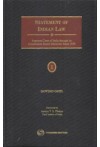
- Author(s): Govind Goel
- Publisher: Thomson Reuters
- Edition: 1 Ed 2016
- ISBN 13 9789384746001
- Approx. Pages 2025 + Contents
- Delivery Time 3-5 working days (within Kerala & South India) (Others 7-9 days)
............................................................................................................................
Description
In a marked departure from the traditional role of a law Court, the Constitution of India not only envisaged the Supreme Court of India to be the final adjudicator of all civil and criminal disputes on account of the abolition of jurisdiction of the Privy Council which was hitherto the final court of appeals, the newly set up Apex Court was also assigned newer and challenging responsibilities of a Constitutional Court as a guardian and protector of the Constitution in its role of the sentinel on qui vive having unique jurisdiction of issuance of appropriate writs for the enforcement of fundamental rights enshrined in the Constitution. Apart from guarding individual rights, the Court has also been assigned the responsibility of determining the validity of exercise of all legislative, executive and constituent powers and act as the ultimate check against their possible transgression or misuse. The quintessential place assigned to the Supreme Court not only to protect rights of the citizens; as the umpire for any difference among constituents of the Federation; as the final arbiter for all constitutional organs; to create and ensure delicate and smooth balance among all parties to the constitutional scheme; but also the ensure supremacy of the Constitution indicates a unique and unparalleled place for the Supreme Court in the politico-legal system of India. By virtue of Article 141 of the Constitution, all courts within the territory of India being bound by law declared by the Supreme Court, the enunciation of law by the Supreme Court binds itself as well and such enunciation of law provides a valid source of law. These features of the Supreme Court place it in a challenging and enviable position of singularly greatest responsibility.
............................................................................................................................
Contents
Volume I
Chapter 1: The Equality Principle
Chapter 2: Freedoms and Restrictions
Chapter 3: Life and Personal Liberty
Chapter 4: Right to Property and Constitutional Immunities
Chapter 5: Freedom of Religion and Cultural & Educational Rights
Chapter 6: Remedies and Powers of Constitutional Courts
Chapter 7: Other Constitutional Issues
Volume II
Chapter 8: Taxation Law
Chapter 9: Administrative, Service and Labour Laws
Chapter 10: Civil Law
Chapter 11: Criminal Law
Chapter 12: International Law
Chapter 13: Constitution Bench Decisions: A Statistical Conspectus
............................................................................................................................
